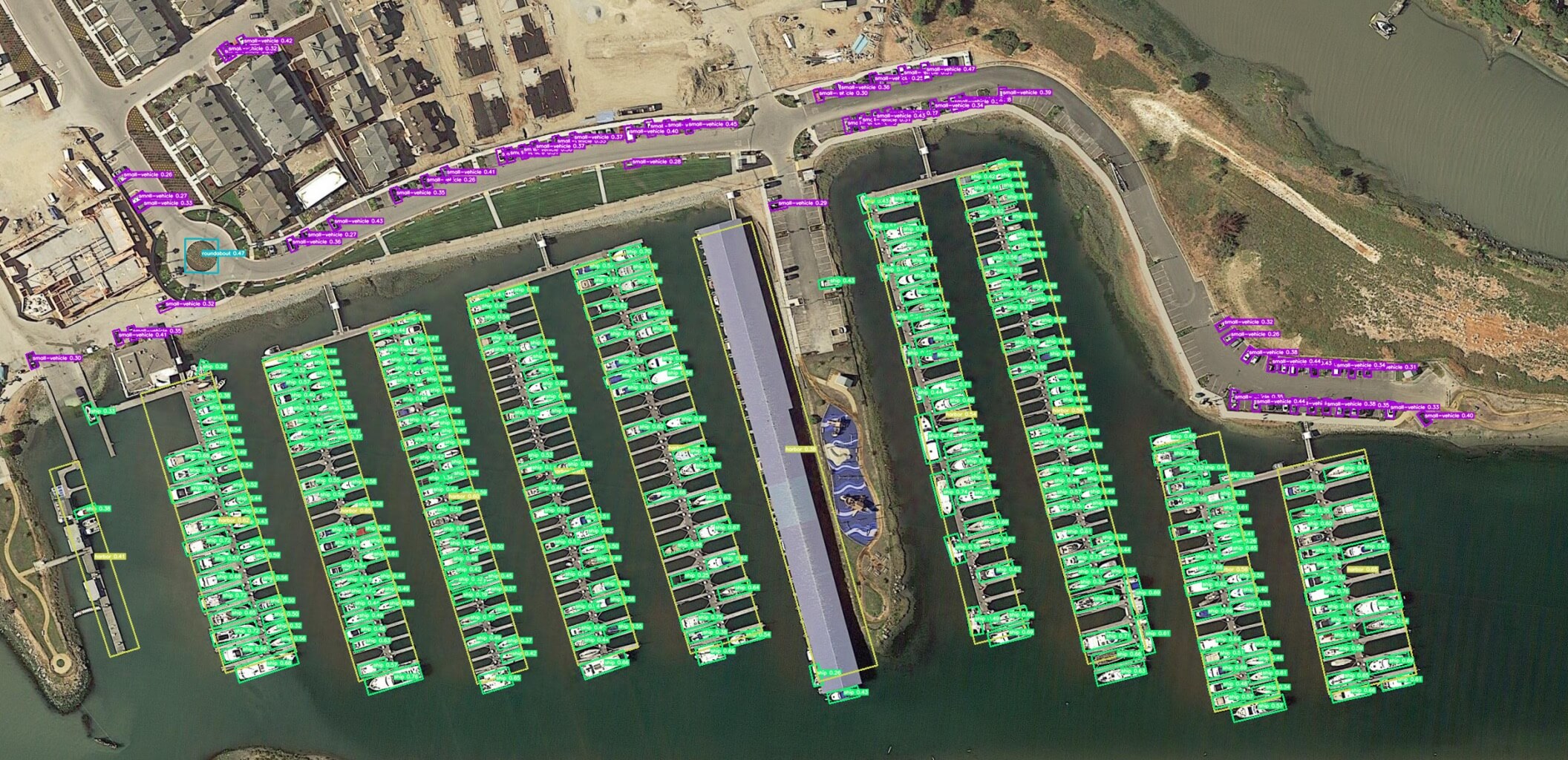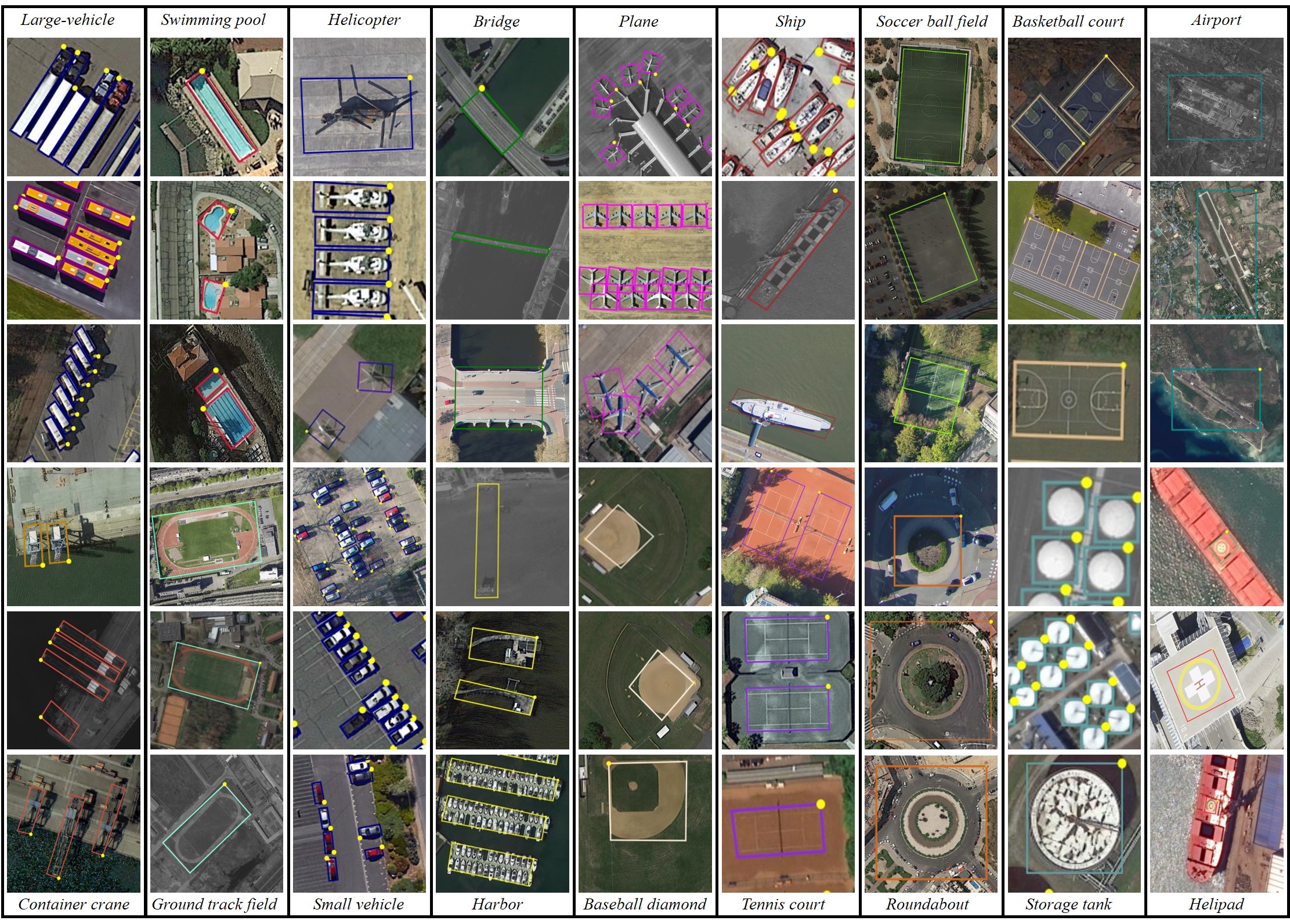comments: true
description: >-
Delve into DOTA v2, an Oriented Bounding Box (OBB) aerial imagery dataset with
1.7 million instances and 11,268 images.
keywords: >-
DOTA v2, object detection, aerial images, computer vision, deep learning,
annotations, oriented bounding boxes, OBB
DOTA v2 Dataset with OBB
DOTA v2 stands as a specialized dataset, emphasizing object detection in aerial images. Originating from the DOTA series of datasets, it offers annotated images capturing a diverse array of aerial scenes with Oriented Bounding Boxes (OBB).
Key Features
- Collection from various sensors and platforms, with image sizes ranging from 800 × 800 to 20,000 × 20,000 pixels.
- Features more than 1.7M Oriented Bounding Boxes across 18 categories.
- Encompasses multiscale object detection.
- Instances are annotated by experts using arbitrary (8 d.o.f.) quadrilateral, capturing objects of different scales, orientations, and shapes.
Dataset Versions
DOTA-v1.0
- Contains 15 common categories.
- Comprises 2,806 images with 188,282 instances.
- Split ratios: 1/2 for training, 1/6 for validation, and 1/3 for testing.
DOTA-v1.5
- Incorporates the same images as DOTA-v1.0.
- Very small instances (less than 10 pixels) are also annotated.
- Addition of a new category: "container crane".
- A total of 403,318 instances.
- Released for the DOAI Challenge 2019 on Object Detection in Aerial Images.
DOTA-v2.0
- Collections from Google Earth, GF-2 Satellite, and other aerial images.
- Contains 18 common categories.
- Comprises 11,268 images with a whopping 1,793,658 instances.
- New categories introduced: "airport" and "helipad".
- Image splits:
- Training: 1,830 images with 268,627 instances.
- Validation: 593 images with 81,048 instances.
- Test-dev: 2,792 images with 353,346 instances.
- Test-challenge: 6,053 images with 1,090,637 instances.
Dataset Structure
DOTA v2 exhibits a structured layout tailored for OBB object detection challenges:
- Images: A vast collection of high-resolution aerial images capturing diverse terrains and structures.
- Oriented Bounding Boxes: Annotations in the form of rotated rectangles encapsulating objects irrespective of their orientation, ideal for capturing objects like airplanes, ships, and buildings.
Applications
DOTA v2 serves as a benchmark for training and evaluating models specifically tailored for aerial image analysis. With the inclusion of OBB annotations, it provides a unique challenge, enabling the development of specialized object detection models that cater to aerial imagery's nuances.
Dataset YAML
Typically, datasets incorporate a YAML (Yet Another Markup Language) file detailing the dataset's configuration. For DOTA v2, a hypothetical DOTAv2.yaml could be used. For accurate paths and configurations, it's vital to consult the dataset's official repository or documentation.
!!! example "DOTAv2.yaml"
```yaml
--8<-- "ultralytics/cfg/datasets/DOTAv2.yaml"
```
Usage
To train a model on the DOTA v2 dataset, you can utilize the following code snippets. Always refer to your model's documentation for a thorough list of available arguments.
!!! warning
Please note that all images and associated annotations in the DOTAv2 dataset can be used for academic purposes, but commercial use is prohibited. Your understanding and respect for the dataset creators' wishes are greatly appreciated!
!!! example "Train Example"
=== "Python"
```python
from ultralytics import YOLO
# Create a new YOLOv8n-OBB model from scratch
model = YOLO('yolov8n-obb.yaml')
# Train the model on the DOTAv2 dataset
results = model.train(data='DOTAv2.yaml', epochs=100, imgsz=640)
```
=== "CLI"
```bash
# Train a new YOLOv8n-OBB model on the DOTAv2 dataset
yolo detect train data=DOTAv2.yaml model=yolov8n.pt epochs=100 imgsz=640
```
Sample Data and Annotations
Having a glance at the dataset illustrates its depth:
- DOTA v2: This snapshot underlines the complexity of aerial scenes and the significance of Oriented Bounding Box annotations, capturing objects in their natural orientation.
The dataset's richness offers invaluable insights into object detection challenges exclusive to aerial imagery.
Citations and Acknowledgments
For those leveraging DOTA v2 in their endeavors, it's pertinent to cite the relevant research papers:
!!! note ""
=== "BibTeX"
```bibtex
@article{9560031,
author={Ding, Jian and Xue, Nan and Xia, Gui-Song and Bai, Xiang and Yang, Wen and Yang, Michael and Belongie, Serge and Luo, Jiebo and Datcu, Mihai and Pelillo, Marcello and Zhang, Liangpei},
journal={IEEE Transactions on Pattern Analysis and Machine Intelligence},
title={Object Detection in Aerial Images: A Large-Scale Benchmark and Challenges},
year={2021},
volume={},
number={},
pages={1-1},
doi={10.1109/TPAMI.2021.3117983}
}
```
A special note of gratitude to the team behind DOTA v2 for their commendable effort in curating this dataset. For an exhaustive understanding of the dataset and its nuances, please visit the official DOTA v2 website.

